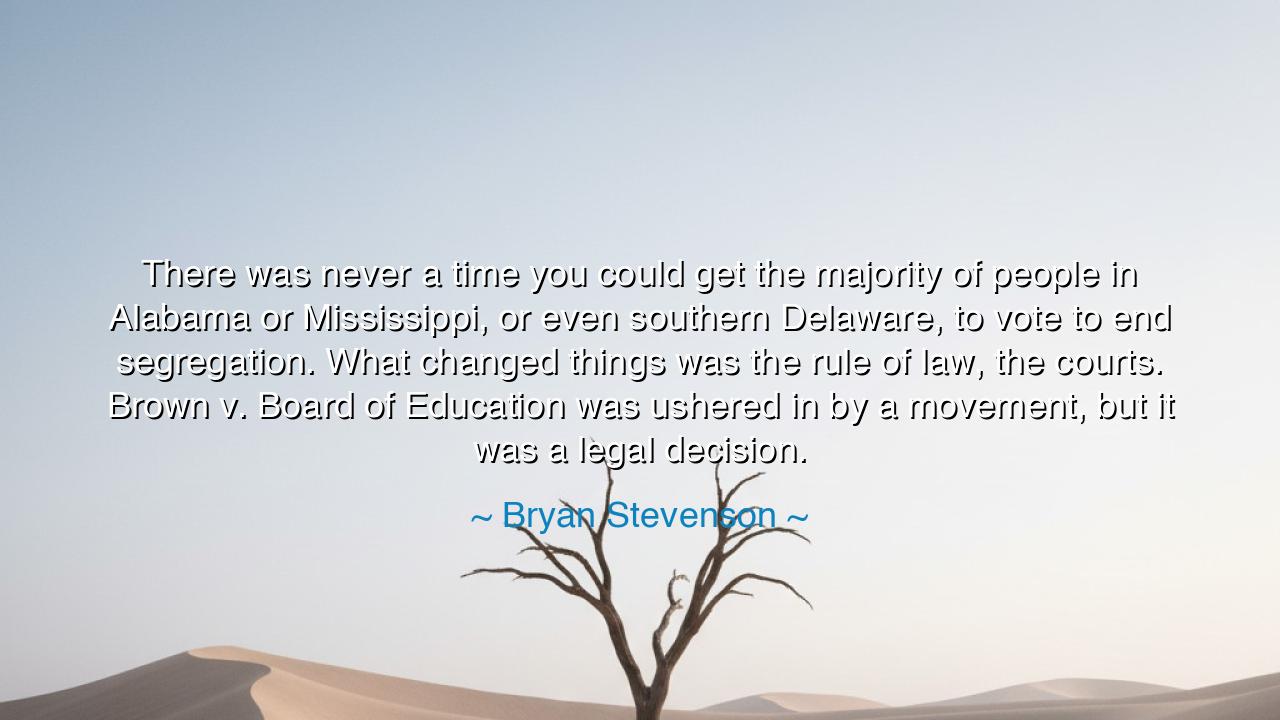
There was never a time you could get the majority of people in
There was never a time you could get the majority of people in Alabama or Mississippi, or even southern Delaware, to vote to end segregation. What changed things was the rule of law, the courts. Brown v. Board of Education was ushered in by a movement, but it was a legal decision.






Hear the words of Bryan Stevenson, a defender of the poor and the condemned, who spoke with the clarity of both history and conscience: “There was never a time you could get the majority of people in Alabama or Mississippi, or even southern Delaware, to vote to end segregation. What changed things was the rule of law, the courts. Brown v. Board of Education was ushered in by a movement, but it was a legal decision.” In this truth lies the reminder that justice does not always flow from the will of the majority, but often from the higher call of law, conscience, and those brave enough to wield them.
For Stevenson knew that segregation was not simply custom, but a system of power fortified by prejudice, fear, and habit. In the Deep South, as in many places, no popular vote would ever have broken those chains, for the majority benefited from their weight. Left to numbers alone, injustice would have remained enthroned. Thus Stevenson points us to the power of law and the courts—institutions which, when guided by courage, can restrain the tyranny of the majority and lift up the rights of the few.
Consider the moment of Brown v. Board of Education in 1954. It was not the ballot box of Mississippi or Alabama that struck down the lie of “separate but equal,” but the judgment of the Supreme Court, declaring that segregation in schools violated the Constitution’s promise of equal protection. That decision, though resisted with rage, became a turning point. It gave the movement for civil rights not only moral fire but legal foundation. It was proof that even when a people refused to see justice, the law could force their eyes open.
History is filled with such moments. In ancient times, Solon of Athens gave laws to protect the poor from the crushing debts imposed by the rich. The wealthy would never have voted to surrender their advantage, yet Solon, through law, broke the bonds of slavery and restored balance to the city. Or recall the Emancipation Proclamation of Abraham Lincoln. Few in the South would have voted to end slavery, but the law, carried on the authority of the president and the victory of war, shattered chains that ballots would have left unbroken.
Stevenson’s words also honor the movement—the countless men, women, and children who marched, sang, bled, and endured imprisonment to awaken the conscience of the nation. Without them, no legal decision would have been made. But without the legal decision, their cries could not have altered the structures of power. The movement lit the fire; the law set it in stone. Thus the two worked together, hand in hand, to bring forth change.
The lesson is clear: justice often requires more than the will of the people—it requires law bound to morality. The majority is not always right, for the majority once defended slavery, segregation, and exclusion. True justice is measured not by numbers, but by principle, by courage, and by the eternal truth that every human being bears dignity. When the people are blind, it is the duty of courts and leaders to see on their behalf.
And so, O listener, what must you do? Do not wait for the crowd to choose justice, for they may never choose it. Stand with the few who march for what is right. Support the building of laws that defend the weak and restrain the strong. Do not despise institutions, for they can be instruments of liberation when guided by conscience. And remember always: the rule of law, when married to justice, can achieve what fear, prejudice, and the stubbornness of the majority would forever deny.
Thus let Bryan Stevenson’s words echo in your soul: that freedom is not born from popularity, but from courage. Movements awaken hearts, and laws bind justice to the earth. Together, they carve pathways where none seemed possible, until at last what was once unthinkable becomes the common inheritance of all.






AAdministratorAdministrator
Welcome, honored guests. Please leave a comment, we will respond soon